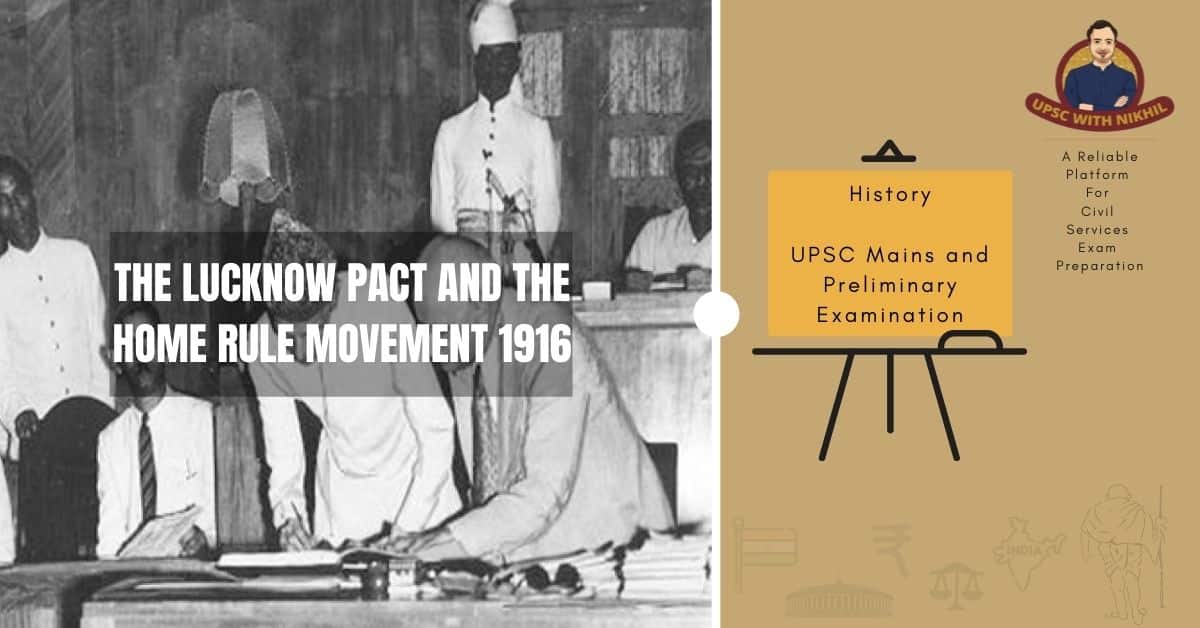The Lucknow Pact And The Home Rule Movement 1916
The Home Rule Leaguers were given the long-awaited opportunity to demonstrate their strength at the Congress's Lucknow session in December 1916. The idea was to flood the Congress with Home Rule Leaguers, so Arundale asked every member of the League to get himself elected as a delegate to the Lucknow session.

• Tilak and his men were welcomed back into the Congress by the Moderate president, Ambika Charan Mazumdar: ‘After nearly 10 years of painful separation and wanderings through the wilderness of misunderstandings and the mazes of unpleasant controversies... both the wings of the Indian Nationalist party have come to realise the fact that united they stand, but divided they fall, and brothers have at last met brothers...’ The famous Congress League Pact, also known as the Lucknow Pact, was signed at the Lucknow Congress.
• Tilak's Home Rule League started a tradition that would become a staple of later Congress annual sessions: a special train was organised to transport delegates from Western India to Lucknow, known variously as the "Congress Special" and the "Home Rule Special."
• Tilak and Annie Besant both played a key role in bringing the Congress and the League together, despite the opposition of many powerful leaders, including Madan Mohan Malaviya.
• Answering the criticism that the Pact had acceded too much to the Muslim League, Lokamanya Tilak said: ‘It has been said, gentlemen, by some that we Hindus have yielded too much to our Mohammedan brethren. I am sure I represent the sense of the Hindu community all over India when I say that we could not have yielded too much. I would not care if the rights of self-government are granted to the Mohammedan community only. I would not care if they are granted to the Rajputs. I would not care if they are granted to the lower and the lowest classes of the Hindu population provided the British Government consider them more fit than the educated classes of India for exercising those rights. I would not care if those rights are granted to any section of the Indian community... When we have to fight against a third party — it is a very important thing that we stand on this platform united, united in race, united in religion, united as regards all different shades of political creed.”
• When confronted with such a stance by the most orthodox of Hindus and the greatest scholar of ancient religious texts, the opposition had little chance of succeeding and faded away. And, while accepting the principle of separate electorates for Muslims was undoubtedly a divisive decision, it cannot be denied that the Pact was motivated by a genuine desire to alleviate minority fears of majority dominance.
• As a step toward self-government, the Lucknow Congress also demanded more constitutional reforms. Despite the fact that this did not go as far as the Home Rule Leaguers had hoped, they accepted it for the sake of Congress unity.
• Tilak also proposed that the Congress appoint a small and cohesive Working Committee to handle the day-to-day affairs of the Congress and be responsible for carrying out the resolutions passed at the annual sessions, a proposal that he hoped would transform the Congress from a deliberative body into one capable of leading a sustained movement. This was one of the major changes considered necessary if the Congress was to lead a sustained movement four years later, in 1920, when Mahatma Gandhi prepared a reformed ‘constitution for the Congress.
• A joint meeting of the two Home Rule Leagues was held in the same pandal after the Congress session ended.
• The Congress League Pact was lauded, and Annie Besant and Tilak spoke at the gathering. Both leaders made triumphant tours through various parts of North, Central, and Eastern India on their return journeys.
• The Government's wrath quickly grew in response to the Home Rule Movement's growing popularity.
• The Madras government was the harshest, issuing the first order prohibiting students from attending political meetings. This order was universally condemned and Tilak commented: ‘The Government is fully aware that the wave of patriotism strikes the students most, and if at all a nation is to prosper, it is through an energetic new generation.”


